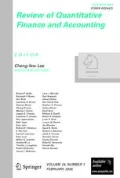Abstract
This paper examines the information aggregation role of options when agents possess diverse information about possible asset returns. We construct two identical experimental markets: one with and one without options. We find that options speed the information aggregation process. Asset markets that have parallel option markets aggregate traders' diverse information faster than markets where options trading is not available. Implied ranges were calculated from asset and option prices and compared to the actual ranges. These comparisons suggest that options may provide a means for agents to coordinate beliefs about asset values.
Similar content being viewed by others
References
Back, K., “Asymmetric Information and Options.” Working paper, Olin School of Business, Washington University in St. Louis, St. Louis, MO (1992).
Bhattacharya, M., “Price Changes of Related Securities: The Case of Call Options and Stock.”Journal of Financial and Quantitative Analysis 22, 1–15 (1987).
Box, G.E.P., W.G. Hunter, and J.S. Hunter,Statistics for Experimenters: An Introduction to Design, Data Analysis and Model Building. New York: Wiley (1978).
Chiras, D.P. and S. Manaster, “The Information Content of Option Prices.”Journal of Financial Economics 6, 213–244 (1978).
Copeland, T. and D. Friedman, “The Effect of Sequential Information Arrival on Asset Prices: An Experimental Study.”Journal of Finance XLII, 763–798 (1987).
Forsythe, R., T.R. Palfrey, and C.R. Plott, “Asset Valuation in an Experimental Market.”Econometrica 50, 537–567 (1982).
Forsythe, R., T.R. Palfrey, and C.R. Plott, “Futures Markets and Informational Efficiency: A Laboratory Examination,”Journal of Finance 39, 955–981 (1984).
Friedman, D., G. Harrison, and J. Salmon, “The Informational Efficiency of Experimental Asset Markets.”Journal of Political Economy 92(3), 349–408 (1984).
Grossman, S.J., “An Analysis of the Implications for Stock and Futures Price Volatility of Program Trading and Dynamic Hedging Strategies.”Journal of Business 61(3), 275–298 (1988).
Jacklin, C.J., A.W. Kleidon, and P. Pfleiderer, “Underestimation of Portfolio Insurance and the Crash of October 1987.”Review of Financial Studies 5(1), 35–63 (1992).
Jennings, R. and L. Starks, “Earnings Announcements, Stock Price Adjustment, and the Existence of Option Markets.”Journal of Finance XLI, 107–125 (1986).
Manaster, S. and R. Rendleman, “Option Prices as Predictors of Equilibrium Stock Prices.”Journal of Finance 37, 1043–1257 (1982).
O'Brien, J. and S. Srivastava, “Arbitrage and Informational Efficiency: Theory and Experimental Evidence.” Working paper, GSIA—Carnegie Mellon University, Pittsburgh, PA (1990).
Plott, C. and S. Sunder, “Efficiency of Experimental Sescurity Markets with Insider Information: An Application of Rational-Expectation Models.”Journal of Political Economy 90(4), 663–698 (1982).
Plott, C. and S. Sunder, “Rational Expectations and the Aggregation of Diverse Information in Laboratory Security Markets.”Econometrica 56, 1085–1118 (1988).
Ross, S., “Options and Efficiency.”Quarterly Journal of Economics 53, 336–359 (1976).
Smith, V., “Microeconomics Systems as an Experimental Science.”American Economic Review 72, 923–955 (1982).
Sunder, S., “Experimental Asset Markets: A Survey.” Working paper, GSIA—Carnegie Mellon University, Pittsburgh, PA (1992).
Author information
Authors and Affiliations
Rights and permissions
About this article
Cite this article
Kluger, B.D., Wyatt, S.B. Options and efficiency: Some experimental evidence. Rev Quant Finan Acc 5, 179–201 (1995). https://doi.org/10.1007/BF01075175
Issue Date:
DOI: https://doi.org/10.1007/BF01075175




